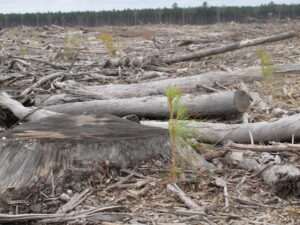Our recommendations for the EU Parliament’s plenary vote on the Renewable Energy Directive
On September 14, MEPs will vote in plenary the new Renewable Energy Directive.
The MEPs decision will determine the future of our forests: voting for more subsidies for bioenergy will increase the pressure on EU forests, already damaged by over-logging. About half of the wood used in the EU is burned for energy. Every year, the EU burns 20 times more wood for bioenergy than what burned in this summer’s forest fires. It simply makes no sense to subsidize it.
We believe our forests must remain standing to support vital biodiversity and keep CO2 sequestered to help EU climate goals. The annual €12 billion of subsidies for bioenergy should instead be invested in real renewables like solar, wind, and geothermal.
The EU needs to protect and restore forests, for people, for biodiversity and for the climate – not log them for energy. MEPs, please vote to protect our future.
Our voting recommendations for forest biomass:
SUPPORT
1. Definition of primary woody biomass (worst type of wood to burn) : weakened by exemptions
Amendment 42
- REJECT ‘natural disasters’ in split vote
Justification: this language could permit subsidies for logging a whole forest just because some trees are affected by a storm
2. Subsidies & targets
Amendments 44, 45, 47
- (1) Stops subsidies for burning forest biomass (keep this)
- (2) Sets a CAP on volume of forest biomass counting towards renewable energy targets – baseline: average 2017-2022.
- REJECT “-2022” in split vote
Justification: wood use in 2022 will be abnormally high; and 2017 is the latest year with available data.
3. Phase down of counting volume of forest biomass to renewable targets.
Amendment 48
- No immediate action until 2026 after Impact Assessment and review.
- REJECT ‘review’ in split vote
Justification: the Commission has already assessed problems with forest biomass – no new review is needed.
4. No support for burning forest biomass in electricity only plants above 20 MW. Reinstates ENVI position
Amendment 50
- Reinstates ENVI position
Justification: electricity only plants are extremely inefficient and do not justify subsidies. At the minimum the large ones should not receive support.
5. Primary woody biomass should not count towards renewable targets or be subsidised.
Amendment 75
- Justification: this position reflects the science. It should be supported.
- large ones should not receive support.
6. Cascading principle of use of wood
Split vote?
- Vote to SUPPORT cascading principle included in RED. It is vital to keep this principle in EU law.
REJECT
1.
Amendment 25
- Justification: Unacceptably further weakens definition of ‘primary woody biomass’ (PWB), thereby keeping biomass incentives intact for nearly all types of wood.
2. Stops existing plants having to meet GHG saving criteria – only some new ones from Jan 2021 will be affected
Amendment 46
- Justification: many installations run for decades, it is vital to minimise their GHG emissions.
Our voting recommendations for biofuels:
SUPPORT
Amendment 1
- This amendment includes the whole ITRE report that was adopted in July; we are supportive of the agreement overall and in particular the palm and soy (via high-ILUC revision) phase out; however, we are concerned about the status quo regarding the food and feed cap – by increasing the overall RES-T target in parallel it will drive the use of crop biofuels (among others) amidst the food security crisis we are facing; please see below more progressive options on the food and feed cap.
Amendment 23
- It suggests a temporary suspension of food and feed biofuels in times of food security crisis like the one we are facing now.
Amendment 54
- It retables the ENVI report on the food and feed cap and adds also the possibility of a temporary suspension of food and feed based biofuels in times of food crisis.
Amendment 55
- It adds to the ITRE text on the phase out of palm and soy the phase-out of by-products as well.
REJECT
Amendments 17-19
- They delete the sustainability criteria on raw materials for biofuels production from agricultural and/or forest biomass
Amendment 31
- It introduces double counting for 6 years for the share of biofuels and biogas from grape marcs and wine lees.
Amendments 35 & 36
- We recommend to reject these two amendments on Annex V and Annex VI that change the emission values in these annexes to less ambitious ones.
Amendment 37
- It includes in part B of Annex IX different biomass fuel feedstocks used in stationary installations outside of transport sector.
Amendment 43
- It proposes weaker text on the cascading principle than the ENVI and ITRE reports.





